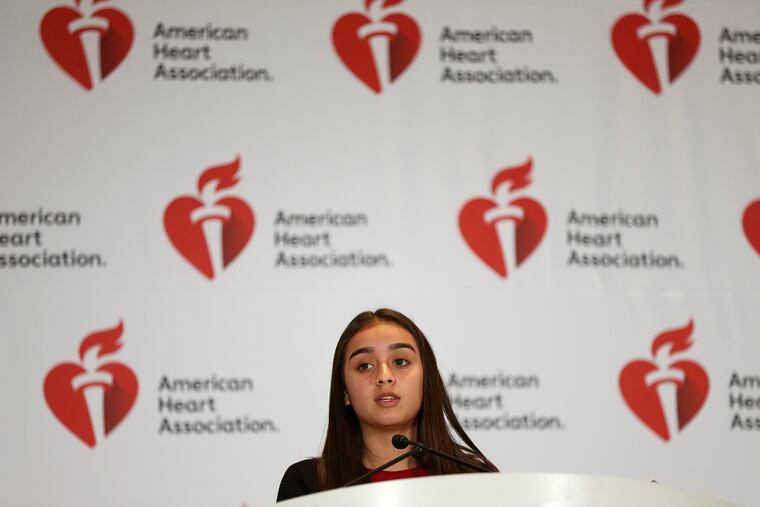American Heart Association to invest $20M for youth vaping research
The American Heart Association will invest $20 million to fund research about the effects of vaping on youth as part of an outreach and policy initiative to combat rising e-cigarette use among teens and adolescents.

Capping a week in which the national toll of vaping-related lung illnesses kept mounting, the American Heart Association announced Friday that it will invest $20 million in research on how vaping affects young people. It is part of an initiative by the group to combat rising e-cigarette use among teenagers and adolescents.
Vaping among teenagers has shot up in recent years, with a quarter of high school students now using e-cigarettes, even as combustible cigarette smoking rates among youth sink. The AHA initiative, announced at its Scientific Sessions conference this week at the Convention Center, will also include outreach to students and a policy fund to push for tighter regulations on flavored vaping pods, which are popular among teenagers.
“This is the single highest priority of the American Heart Association right now,” said Nancy Brown, the organization’s CEO, following an event to announce the campaign. “The vaping industry is using the playbook of Big Tobacco to addict the next generation.”
E-cigarettes are marketed as a safer alternative to cigarettes, intended to help smokers quit. Instead of inhaling smoke, users inhale a vapor that can contain nicotine and other chemicals.
But little is known about the long-term effects of vaping, in part because most e-cigarette products have not been evaluated for safety by the federal government. The Food and Drug Administration has the authority to regulate vaping products, but has not done so.
On Thursday, the U.S. Centers for Disease Control and Prevention announced that 2,172 cases of serious lung illnesses related to vaping have been reported, with 42 deaths. THC, the psychoactive component of cannabis, was found in most samples tested by the agency.
The spate of illnesses “confirmed we have absolutely no knowledge of what this does to youth,” said Mariell Jessup, chief science and medical officer for AHA.
And as candy and fruit flavors dispensed through sleek USB-size devices have become particularly popular in high schools and middle schools, concerns about nicotine addiction and possible long-term effects of vaping chemicals continue to grow.
Katelyn Quezada, an AHA youth advocate from Los Angeles who spoke at the event, said too many teenagers and adolescents don’t realize how harmful and addictive vaping may be.
Now 16, she recalled trying an e-cigarette as a sixth grader, huddled in the girls’ bathroom with friends who passed around different flavors.
“So many teens like me — or younger — are getting hooked,” she said.
» READ MORE: Broomall teen hospitalized for vaping-related lung illness amid national crackdown on e-cigarettes
AHA’s community and school outreach campaign will aim to educate youth about misconceptions about vaping — many teens believe it is safe and aren’t aware the fluid contains high levels of nicotine — and encourage them to push back against e-cigarette companies.
Though vaping has been on the rise among teenagers for years, the issue hit a fever pitch over the summer, as hundreds of people — many otherwise-healthy young adults — were hospitalized with severe lung illnesses related to vaping.
Pennsylvania has reported 90 confirmed and probable cases. New Jersey has reported 74. Pennsylvania, New Jersey, and Delaware have had one death each believed to be vaping-related.
As the number of people sickened continued to climb, President Donald Trump in September ordered the Department of Health and Human Services to draft a plan for banning flavored vaping pods, but the plan has been delayed amid industry pressure, Bloomberg News reported.
Several states, including Pennsylvania and New Jersey, are considering their own legislation that would ban flavored vaping pods.
» READ MORE: As e-cigarette illnesses mount, will NJ be the next to try to ban vaping?
Leading e-cigarette maker Juul has pulled several popular fruit and dessert flavors.
After months of searching for an ingredient or product causing the illness, federal regulators said in November they had identified a “chemical of concern." Vitamin E acetate was found in lung fluid samples from 29 patients in 10 states. The ingredient could be used as an additive or, most notably, as a thickening agent in vaping pods containing THC, according to the Centers for Disease Control and Prevention.
The agency reiterated its public warning against using vaping products containing THC, bought off the street, or for which the manufacturer is not clearly identified.
Jessup said the heart association is particularly concerned about the lack of research about how vaping affects youths because their brains are still developing, which makes them more vulnerable to addiction and, potentially, other effects of vaping.
The AHA research initiative will fund two or three projects intended to help answer those questions. Recipients will be named early next year and are expected to complete their work in two years.
“There’s still so much we don’t know, and time is running out,” she said.